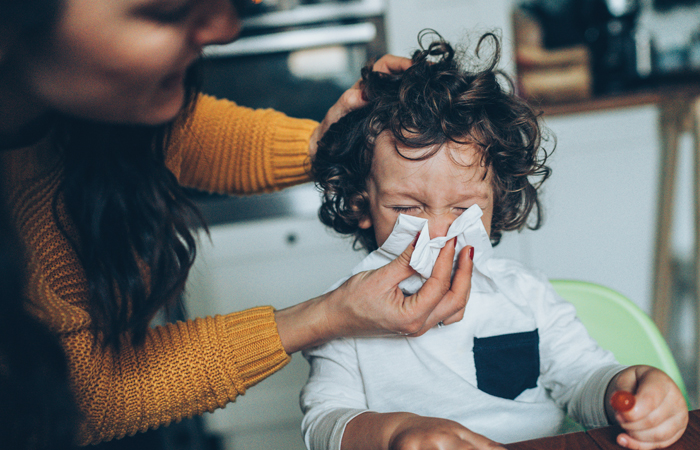In Conditions
Bookmark
Record learning outcomes
With autumn in full swing, now’s the time to enjoy nature’s shifting colours, cosy evenings, and the chance to dig out that warmer winter wardrobe. Unfortunately, it’s also the time where the sound of coughing, sneezing and spluttering can start to be heard in schools, offices and homes across the country.
“In winter, people tend to congregate indoors, and that means it’s easier for viruses to be transmitted,” says pharmacist Thorrun Govind. While many typical winter ailments often clear up by themselves, there’s lots that can be done to make patients more comfortable in the meantime. Pharmacy teams are especially well positioned to advise on over-the-counter (OTC) products and self-care tips, especially if patients are struggling to obtain medicines they might have used in the past.
The good news is that many common winter ailments are often short-lived, and a few simple measures can help patients on their road to recovery. Here we take a closer look at some of the health complaints you may encounter this season.
Cold catchers
The common cold certainly lives up to its name, with adults experiencing two or three bouts a year on average, and children experiencing up to eight. “The common cold is airborne through droplets coughed or sneezed into the air by a sick person, then inhaled by someone else,” says Thorrun. “We’re seeing that common cold viruses appear to be returning to the pre-pandemic levels of circulation, whereas obviously during [the coronavirus pandemic] there were lockdowns and things weren’t spreading as much.”
Symptoms can include sneezing, a stuffy or runny nose, coughing, headache, muscle aches, raised temperature or sore throat. “Most coughs and colds will get better on their own over time,” says pharmacy manager Amanda Smith from Heath Pharmacy in Halifax. “Patients can expect to have symptoms for one to two weeks. If they have a temperature, then paracetamol or ibuprofen can help. It’s important to advise the patient that they need to give their body a chance to heal itself, so get plenty of rest and sleep, and keep their fluid intake up. A decongestant may help, but remember to check that any medicines you recommend are suitable for the patient.” Decongestants should not be given to children under six, and those aged six to 12 should take them for no longer than five days.
Cough it up
While many coughs often accompany colds or flu, other causes may include allergies, smoking or an infection such as bronchitis. Common types of cough include a productive cough, where the patient brings up phlegm and a non-productive cough which can be characterised as dry or tickly cough.
As with colds, paracetamol or ibuprofen can help with pain relief, and self-care tips including rest and plenty of fluids should be offered. Sipping warm water with lemon and honey can also feel soothing (though honey shouldn’t be given to babies below 12 months).
In many cases, a cough can be dealt with at home, and will go away within two to four weeks. However, in some cases, patients should be told to contact a GP as soon as possible. This includes those who are immunosuppressed or have:
- A barking cough (which could be a sign of croup, a common condition in young children)
- Suspected whooping cough (in which case the doctor may suggest conducting the appointment remotely, as it can spread easily)
- Swollen glands
- Unexplained weight loss
- A cough that is severe or lasts more than three weeks.
Patients should seek immediate medical attention if they suffer chest pain while coughing (which may be a sign of pneumonia), cough up blood or are struggling to breathe.
Sore throat
Often triggered by a virus (such as colds or flu), sore throats can also be caused by conditions such as tonsillitis or glandular fever. While antibiotics may be prescribed for a bacterial infection such as strep throat, they’re not effective against viruses, which can usually be treated at home.
“We can obviously help in the pharmacy with painkillers and with medicated lozenges,” says Thorrun, adding that self-care steps can include drinking plenty of water, sucking ice cubes, gargling with warm, salty water and resting. “For some people, if their sore throat hasn’t improved after a week or if they’re getting sore throats really often, we need to get them to go and see a GP. If they’ve got a sore throat in conjunction with a very hot temperature, or they’re feeling very hot or shivery, that’s something that we need them to call 111 or seek more urgent medical attention over.”
Patients should call 999 if they have difficulty breathing/stridor, are drooling or unable to swallow, or have severe symptoms and are rapidly getting worse.
Flu fighting
With colds, flu and coronavirus (see panel) all doing the rounds this time of year, it can be tricky for patients to tell which one they’re suffering from. “Flu has many symptoms in common with coronavirus – things like sore throat, fever, cough, muscle aches, runny nose, shortness of breath – but it’s unusual for flu to cause a loss (or change) of taste and smell, which is what can happen with coronavirus,” says Thorrun. Flu symptoms also typically tend to be more severe than the common cold, often coming on rapidly, and can include diarrhoea or nausea and vomiting.
Advice about taking suitable painkillers, drinking plenty of water and resting applies yet again, and many people should start feeling better after about a week. However, some patients may be at higher risk of flu complications – such as those who are over 65, pregnant or have certain medical conditions – and they should be referred to their GP urgently. People whose symptoms haven’t improved after a week, or who are worried about a child’s symptoms, should also see a doctor or dial 111.
As flu is very contagious, it is important that people know that they can help to reduce the risk of spreading it by washing their hands regularly, using tissues when coughing/sneezing and then binning them, regularly cleaning surfaces (such as door handles), and staying off from work/school until they feel better.
While most patients with flu will recover, it can be deadly – the UK Health Security Agency (UKHSA) reported that “influenza-related mortality for winter 2022/23 is estimated at nearly 15,000”. According to the World Health Organization (WHO), the most effective way to protect against flu is annual vaccination.

Using tissues when sneezing can help to reduce the risk of spreading flu.
Pholcodine withdrawal
“There has been a shortage of common cold and flu medicines since the withdrawal of pholcodine from over-the-counter sale,” says pharmacy manager Amanda Smith from Heath Pharmacy in Halifax. “As this was a common ingredient in cough and cold remedies, many of them disappeared over a short space of time.
“Popular medicines such as Day Nurse were suddenly no longer available. There was an increased demand for the few products that were unaffected by the pholcodine withdrawal, and they very quickly became unavailable as well. We are starting to see some cough and cold remedies come back into stock. Unfortunately, any that contained pholcodine will need to be reformulated and that doesn’t happen overnight, so it will take some time for stock levels to fully recover.”
Perhaps inevitably, this supply-versus-demand struggle – not to mention the cost of living crisis – has had an impact on prices. “We have also seen price rises in paracetamol products which have gone up quite significantly,” adds Amanda.
In some cases, patients may no longer be able to find – or afford – products they would have previously bought, in which case you can help by highlighting other options. “Pharmacy teams should familiarise themselves with the products that they do have, so that they can recommend an alternative that is similar to the one the patient normally chooses,” she continues.
With any medicines, always consider the patient’s age and any contraindications, and remind them to read the patient information leaflet carefully. Aspirin, for example, should not be given to children under 16 (unless specifically indicated by a specialist), according to NICE, due to the risk of Reye’s syndrome.
When self-treating at home for illnesses such as colds and flu, patients need to be careful with their paracetamol dosing, warns pharmacist Thorrun Govind. “I think it’s really easy to overdose with some of these medicines because you maybe aren’t paying attention,” she says. If a patient takes a drink containing paracetamol (such as Lemsip), for example, they shouldn’t then be reaching for paracetamol tablets as well. In the event of an accidental overdose, medical advice should be sought immediately.
“Decongestants should not be given to children under six”
The vaccines
Just when you thought it was safe to step away from the sanitiser, another strain of coronavirus has yet again raised concerns. This time the variant hitting the headlines is Pirola, or BA.2.86, which is said to have evolved from last year’s chief culprit Omicron. In late August, the Government announced that this year’s autumn flu and Covid vaccine programmes would start earlier than planned in England as a “precautionary measure”.
Maria Caulfield MP, parliamentary under-secretary of state at the Department of Health and Social Care (DHSC) and Minister for Women said at the time: “As our world-leading scientists gather more information on the BA.2.86 variant, it makes sense to bring forward the vaccination programme. It is absolutely vital the most vulnerable groups receive a vaccine to strengthen their immunity over winter to protect themselves and reduce pressure on the NHS. I encourage anyone invited for a vaccination – including those yet to have their first jab – to come forward as soon as possible.”
Chief executive of the UK Health Security Agency (UKHSA), Dame Jenny Harries, added: “As we continue to live with Covid-19 we expect to see new variants emerge.
“Thanks to the success of our vaccine programme, we have built strong, broad immune defences against new variants throughout the population. However, some people remain more vulnerable to severe illness from Covid-19. This precautionary measure to bring forward the autumn programme will ensure these people have protection against any potential wave this winter.
“There is limited information available at present on BA.2.86 so the potential impact of this particular variant is difficult to estimate. As with all emergent and circulating Covid-19 variants – both in the UK and internationally – we will continue to monitor BA.2.86 and to advise government and the public as we learn more. In the meantime, please come forward for the vaccine when you are called.”
The announcement stated that “for operational expediency and in line with public health recommendations, wherever possible flu and Covid-19 vaccines should be administered at the same time”.
The full eligibility criteria for the two vaccines can be found on the NHS website – but both include adults aged 65 or over, those in residential care homes, frontline health and social care workers, pregnant women and patients in certain clinical risk groups.
Patients who are not eligible for the free flu jab may wish to pay for a private vaccine at a local pharmacy. While suitable for most adults, contraindications include a confirmed anaphylactic reaction to a previous dose of the vaccine or a component of the vaccine (in the case of egg allergy, the patient should speak to their pharmacist or GP about a low-egg or egg-free option). People who are ill with an acute infection or fever should postpone their appointment until they feel better. For more information on the children’s flu vaccine programme, parents can speak to their GP or child’s school.


